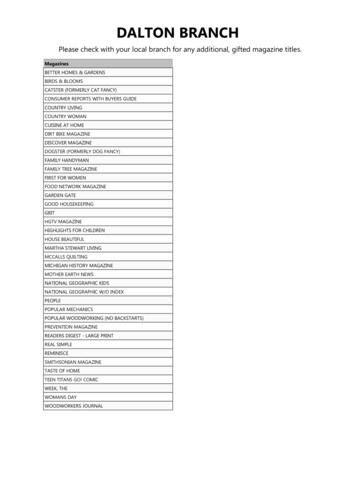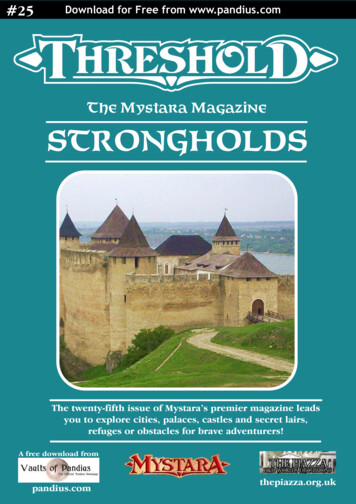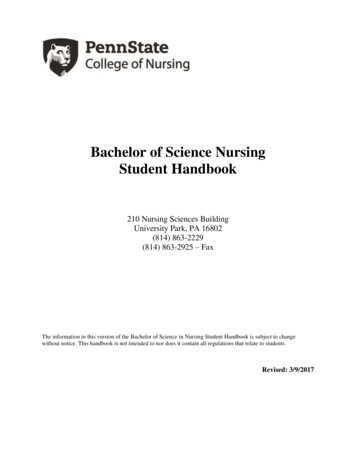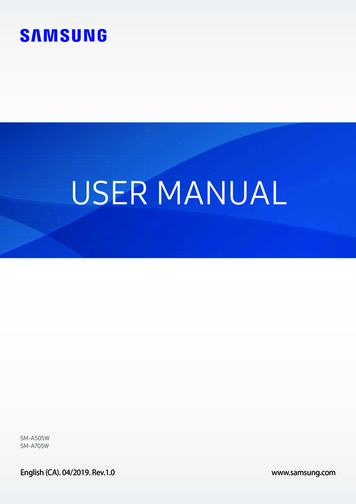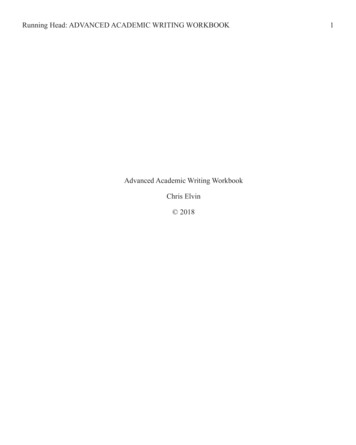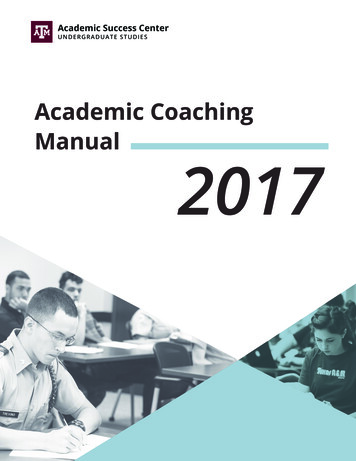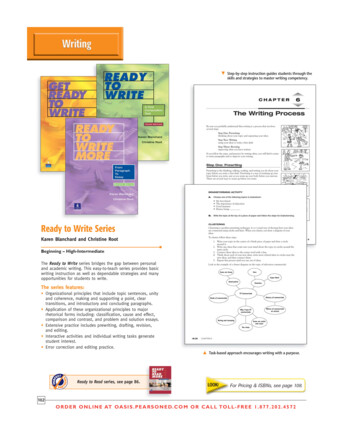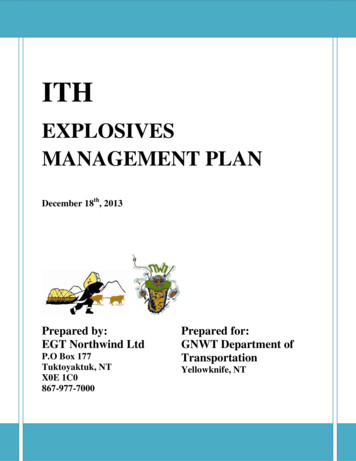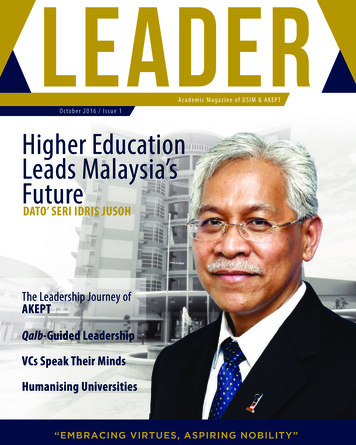
Transcription
LEADERAc ademi c M agazi ne of US IM & AK EPTO ct o b e r 20 16 / Iss ue 1Higher EducationLeads Malaysia’sFutureDATO’ SERI IDRIS JUSOHThe Leadership Journey ofAKEPTQalb-Guided LeadershipVCs Speak Their MindsHumanising Universities“EMBRACING VIRTUES, ASPIRING NOBILITY”
CONTENTSEDITORIAL BOARDBOARD OF ADVISORProf. Dr. Mohamad Kamal Haji HarunProf. Dato’ Dr. Musa AhmadCHIEF EDITOR020309151721232527Dr. Norhidayah AzmanVICE CHIEF EDITORAssoc. Prof. Dr. Mohd Rushdan Mohd JailaniEDITORSAssoc. Prof. Dr. Ismie Roha Mohamed JaisDr. Amalina Ahmad TajudinZulkarnin Zakaria29313335Noor Adzrah RamleSyaik Afzan Abu KasimSECRETARIATMuhamad@ Abd Malik Daud@ Abd AzizMuhammad Aqhari TajudinMohd Kuizwa Mohd Johari3740Chief Editor’s NoteCover Story: Interview with YB Dato’ Seri Idris JusohAKEPT Academic Leadership Talk Series (ALTS)The Leadership Journey of AKEPTIntroducing Qalb-Guided Leadership ModelStrategizing University of Malaya for Global RecognitionThe Practice of Leadership from thePerspective of the Aqli and Naqli Knowledge IntegrationLeadership Criteria Needed to be World Class MTUNTransformative Higher Education Leadership: Anticipating theGame ChangerDiagnosing Leadership Revolution in Universities: The Case ofDeanship PortfolioContextual Leadership for Higher EducationTransformational Leadership And Organisational Excellence OfMalaysian Public UniversitiesHumanising UniversitiesImam Feisal on Building a MuslimCommunity in the WestAKEPT Highlight
CHIEF EDITOR’S NOTE“Leadership and learning are indispensable to each other.” – John F. KennedyAssalamualaikum and welcome to this historic edition of the LEADER Magazine, the first involving the joint participation of the Higher Education Leadership Academy (AKEPT) and Universiti Sains Islam Malaysia (USIM). LEADER aimsto become the leading academic magazine in Malaysia to facilitate the discourse of all issues pertaining to university leadership both locally and abroad. The inception of LEADER could not have come at a better time. The Malaysian higher education scene is truly a fascinating kaleidoscope of opportunities and challenges. Amidst the backdrop of our diversity in cultures and capabilities, it is remarkable to note how far we have come since the foundingof our nation’s first university back in 1949. Today, we are undergoing tremendous changes on all fronts, from rapidtechnological advancements to the changing pedagogical landscape of today’s youths. How do we ensure thatwe can compete with the world’s best whilst keeping steadfast to the moral values that embody our identity as aMalaysian?LEADER provides a channel for thought leaders to share their “war stories” and disseminate their knowledge to theirpeers. Our editorial board’s aspiration is to see this magazine become a prominent avenue for Malaysian highereducation staff to learn from luminaries of various academic fields. With the collective brainpower of the brightestminds in Malaysian higher education, we will strive to shift the old paradigms bounded by our colonial past, andcreate our own brand of higher education that is uniquely Malaysian.In this issue of LEADER, our cover story showcases YB Dato' Seri Idris Jusoh, Minister of Higher Education, Malaysia,where he shares his vision of how higher education will lead the country’s future. The highs and lows of navigatingthe Malaysian higher education arena are further discussed by the director of AKEPT in his musings of the journeyAKEPT has traversed so far. This is followed by thought-provoking articles penned by esteemed Vice Chancellors andacademic staff members from higher education institutions across the world, introducingconcepts such as the qalb-based leadership model and humanizing universities.It is hoped that the expertise, clout and reach of AKEPT, together with the drive andenthusiasm of USIM academic staff members, will deliver a continuously improvingLEADER magazine experience. Sincere gratitude goes to Prof. Tan Sri Dato’ DzulkifliAbdul Razak and the Faculty of Leadership and Management, USIM. Previous editionsof this magazine had been pioneered under their auspices, and I am greatly proud tosee the evolution of this magazine from humble beginnings to where it stands today. Aswe are in the world of education, learning is a continuous life-long process. Producingthis issue of LEADER has been a steep learning curve, but I am excited at the prospectthis journey offers. My resolute belief is that we can achieve truly remarkable things ifwe work together. It is an honour to be part of this joint-venture between USIM andAKEPT. It is hoped that this collaboration will spearhead fruitful contributions towardselevating the university leadership scene of Malaysian higher education.Dr. Norhidayah AzmanChief EditorWe welcome all forms of feedback and article contributions. E-mail us atdayah@usim.edu.my or aqhari@mohe.gov.my. Thank you!LEADER 02
Higher Education Leads Malaysia’s FutureCover StoryHigherEduationLeads Malaysia’sFutureA Co nve rs ati o n w i th :YB Dato’Seri Idris JusohB y Pro f. D r. M o hamad K amal Haj i HarunMany thanks for agreeing to this interview. Tellus, how did you feel when you first heard thatyou were appointed as the Minister of HigherEducation?The announcement was unexpected, I was pleasantly suprised. Alhamdulillah, syukur. I am always ready toserve, and I consider this responsibility a great trust(amanah).Now given the mandate, what are the threepriority areas that you wish to focus on as theMinister.There are 3 priority areas, namely to provide qualityeducation, to nurture holistic students and toenhance graduate employability.03 LEADERWith regards to quality education, my pledge to allMalaysians is to provide the best education that thesystem can offer.In order to achieve this, The Ministry and I are guidedby the Malaysia Education Blueprint 2015-2025(Higher Education). 10 shifts have been identified toachieve our goals.The Blueprint was developed after 3 years s, as well as renowed internationalorganizations. Quality education is a top priority,because when this is achieved, our other goals will fallinto place.
Cover StoryHolistic Students: Under the Higher Education Blueprint,the 1st shift is to nurture holistic, entrepreneurial andbalanced graduates. We want students who are notonly academically excellent, but also possess highmoral and spiritual values. Today’s students are tomorrow’s leaders, and it’s clear why this is a priority.ltidisciplinary to enable students to meet the expectedcriteria.Enhance Graduate Employability. Besides the pursuitof knowledge, higher education plays a vital role inensuring that its students are able to find jobs, startscareers, and earn a livelihood.The current education system, “perfect in meeting the needs of the ege of industrialization, isnow becoming obsolete”. Students can nolonger be fed with information/knowledge. Theyneed to learn to be leaders equipped with theappetite and the cross-disciplinary skills to solveunknown problems. How do you plan to addressthis?If our curriculum does not keep up the times, it willbecome obsolete. To avoid this, we need our curriculum to envolve and to enhance industry-academicpartnerships to ensure greater relevancy and a morecomprehensive education experience.I agree that students today need to be cross-disciplinary. Students must appreciate history as much asthey do the sciences, religion as much as they doeconomics.At the same time, students also need to be multi-lingual. Malaysians are fortunate for being raised in amulti-lingual society. We must make the most of thisand I believe this will male us competitive and holistic.We plan to address this need in various ways. Firstly,through a flexible education approach. I had mentioned this in my 2016 Policy Speech. Flexible education refers to a scenario where can be gainedanywhere, anytime, by anyone. The example Ifrequently cite is a student takes Economics 101 inUniversiti Malaya, then Economics 201 in Universiti SainsMalaysia. Thereafter, the student takes a MOOC fromSunway University and received credit for it. At the endof the students studies, he or she receives a jointdegree from all relevant institutions.Secondly, we have introduced the iCGPA (integratedcumulative grade point average) assessment methodwhich seeks to assess students more holistically across8 criteration. Through the iCGPA, it is hoped that highereducation curriculum becomes more diverse and muLEADER 04
Higher Education Leads Malaysia’s FutureCover StoryCreativity expert, Sir Ken Robinson, argues that toget the best out of people, we need to realize thesignificance of nurturing creativity. And certainlywe are in agreement that Malaysia’s future isabout innovation, creativity and smart growth.Do you think the Ministry has a plan radicalenough to nuture creativity and innovationamong our college going students.Yes, under the Blueprint, Shift 7 mentions the creationof an “Innovation Ecosystem”. We are promotinginnovative teachings, research on innovation andmany more.Recently I attended a talk by Prof. Dato’ Dr.Mohamed Amin Embi from UKM, who recentlyreceived 2 international awards, the ‘IndividualEducator Award’ and the ‘Open MOOC Award’ fromthe Open Education Consortium.His award-winning MOOC entitled “Rethinking Learning, Redesigning Teaching’ attempts to change theway technology enhances our learning experiences.He has trained more than 2000 people over 82 countries all over the world.Many universities and colleges in Malaysia areapproaching education differently nowadays tonurture creativity, and I believe this will only increasein time to come.05 LEADERUniversity reform in the Malaysia can be understood in light of the following dilemma: thesystem must expand and deliver excellence if itis to meet the demand for skill in the labourmarket and innovation based economy. Buthow can it expand under the rubric of the currentausterity measure? In the case of higher education, the government has cut state funding foruniversities and at the same time working toreorganize and transform the system alongmarket lines, re-pivoting the relationshipbetween the students, the institutions and themarket. Can you explain how are you going tonavigate such challenges?I have mentioned in the past that public universitiesare too depandent on government funding and thismust change. The government currently providesabout 75% to 95% of funding. Internationally the average is closer to 50%.Higher education institutions need to be proactive innavigating the current financial challenges. Over thelast few years, public universities have been requiredto explore income-generating and fund-raisingmodels as a way to augment their costs.challenges?
Cover StoryI am happy to note that most universities have beenable to meet their targets, but these effortsmust beincreased. Among the methods universities are encouraged to explore include leveraging on alumni; collaborating with industry; unlocking land assets; and creatingendowments or waqf. Shifts 5 of the Blueprint is on ‘Financial Sustainability’. We are also in the process of comingup with a playbook to assist universities in the regard.Austerity measures should push them to be more innovative and creative.In my 2016 Policy Speech, I spoke of the Commonalitiesand Collegiality approach. This is a concept whichinvolves the coming together of higher education institutions with regard to the sharing of resources and expertise. This may include sharing common learning spaces;professors; joint purchasing of equipment; and facilities.By maximizing resources, universities can not only savefunds, but also enhance student learning experinces.At the same time, leveraging on online learning will beimportant to reduce infrastructural costs. It will alsoenable lecturers focus on more meaningfull discussionswith their students during face-to-face classes.The way research is organised and carried out inuniversities are changing in many countries.Increasingly, funding agencies prefer to backmultidisciplinary and applied research, whilenational priorities often require research to benefitthe wider community, whether it is industry, economic growth or regional development. What is theMinistry’s respond to this changing trend?Leadership is very important yet is frequently underestimated. Finding the right leaders is always a challenge –not just in universities but also in industry. Leaders mustbe indentified, groomed, exposed as well as constantlyupgraded in terms of their skills and abilities.The Ministry is currently embarking on an exercise toidentify the next generation of leaders in higher education with AKEPT playing an important role.In a competitive global economy, we need tomake sure out higher education system keepspace with the best in the world. Young peoplestudying in Malaysia need to know that theirdegree can take them anywhere. We need arelentless focus on the quality and impact of ourhigher education institutions. A world-class highereducation system is vital to a worldclass economyand world-class living standards. Do you think weare moving in the right direction? And/or are wemoving at the right pace in respond to the fastchanging global higher education landscape?I believe that we are. Our Blueprint was drafted with thefuture of higher education growth in mind. We must alsobear in mind that emerging technologies are changingthe higher education landscape, at times faster that wecan imagine, so it is important for us to always be up todate, to be on top of things and to be able to respondto the needs of the future student. Shift 8 of our Blueprintspeaks of ‘Global Prominence’. Ensuring we have aworldclass education system is part of the aims of thisShift.Research must always be conducted with a purpose.Most research carried out by our universities is for fundamental knowledge purposes – i.e. to generate knowledge, discover new thimgs, and to enhance to body ofunderstanding of a particular field. And yes, all researchmust benefit the wider communitySome research leads to commercialization. Malaysia iscurrently at about 4.2% which is close to the world average. Indeed this must be increased, but we must alwaysstrike a balance with regard to the purpose of research.Many argue that one of Malaysia’s biggest challenges in the development higher education isfinding the right talent to fill university leadrshipposition. Do you agree with this argument and whydo think is happening? What more need to bedone then?LEADER 06
Higher Education Leads Malaysia’s FutureCover StoryYou have this strong passion for education.When you were the Menteri Besar Terengganu,you implemented a lot of transformative initiatives in the lower and secondary education inthe state. Do you think, if given a change, youwant to manage a university? Post retirement.This is very common in the United States andUnited Kingdom. The goodexamples, are Lawrence Summers and Condoleezza Rice.Yes, I am passionate for education. Throughout mycareer as an entrepreneur and politician, I’ve alwayssought opportunities to further my knowledge whenever I had the time. I believe that learning is lifelong.When I was younger I did my MBA in USA, then Istudied Arabic in Jordan, then I went to Harvard andINSEAD. Most times I was self-funded. I do not hesitateto invest in education. I will do anything for education,so we shall see what the future holds.Tell us, what’s your aspiration for AKEPT. How canwe help realize your vision?I see AKEPT playing a vital role in honing leadership inour universities. I want AKEPT to identify from thebeginning potential leaders, to groom them, exposethem, and continuosly enhance their skills and abilitis.If AKEPT is successful, we will have good Vice-Chancellors which means we will have good universities.Each of You is aLeader and YouWill Be AskedAbout YourResponsibilitiesAny final thoughts on our education system?I believe our education system is improving and hasmany successes to be proud of. That is why I hadintroduced the tagline “Soaring Upwards”. SoaringUpwards is the official battle cry of the Ministry. Itrecognizes the success of our researchers, studentsand higher education community while acknowledging that improvement efforts are an ongoing process.For example:i. This year , 3 of our professors were recognized as theWorld’s Most Influential Scientific Minds by ThomsonReuters.ii. Our students from Universiti Teknology MARA (UiTM)won the Cambridge Intervarsity Debate in 2015, oneof the most prestigious debating tournaments in theworld, beating Oxford , Harvard and Cambridgethemselves.07 LEADERProphet Muhammad (peace be upon him)
Cover Story10 SHIFTS OF MALAYSIAN EDUCATION BLUEPRINTiii. Universiti Malaya is in the top 150 in the world, at146th, ahead of universities such as RMIT, Newcastle,Sciences Po, Georgetown and George Washington.iv. 4 of our Public Universities are in the world’s top 50under 50. Leading the list is Universiti Sains Malaysia(USM) at no. 26.v. In the 2016 QS World University Rankings: By Subject,3 subjects are in the world’s top 50, namelydevelopment studies (30th) and electrical andelectronic engineering (37th) both at UniversitiMalaya; and Chemical Engineering (46th) at USM.Moreover, 13 subjects are in the world’s top 100.vii. And most recently in early May 2016, a BritishCouncil report placed Malaysia and Germany as the zation of higher education.The above are just a few of the success stories of ourhigher education system. Hence the saying, SoaringUpwards.What’s important is to communicate effectively, and Ihope that all stakeholders take it upon them to sharethis positive news.vi. Our research landscape has grown by 594% sincewe introduce the Research Unuversities project in2007, according to Thomson Reuters. In the last 5 years,we have overtaken Singapore and Thailand in termsof publication volume.LEADER 08
A c a d e m i c L e a d e r s h i p Ta l k S e r i e s ( A LT S )Academic Leadership Talk Series (ALTS)AKEPTAcademic LeadershipTalk Series (ALTS)AKEPT’s Academic Leadership Talk Series (ALTS) is aneight-part talk series focusing on university leadership,with the intention to provide a platform to deliberateand help shape thoughts on academic leadership,academic management and institutional leadership.This is particularly true in today’s ever-changing landscape of Malaysian higher education. The format ofeach slot varies from talks to forums to roundtabledialogues. The ALTS is targeted towards AKEPT’s selectedtalent pool of university leaders, including heads ofprogrammes and faculty deans. The invited speakersrange from vice chancellors to ministerial staff, sharingtheir vast knowledge and experience in a multitude ofcurrent topics. This edition of LEADER presents selectedsessions from the first three ALTS dates.ALTS Session #1: 17 March 2016By: Dr. Norhidayah Azman, USIMThe inaugural edition of ALTS kicked off with welcomingremarks from Prof. Dr. Mohamad Kamal Hj. Harun, theDirector of AKEPT. From prior engagements withacademic stakeholders, the general consensus was that“universities should place absolute commitment to thequality of higher education,” and that quality revolvesaround individual respect, beliefs, sense of caring for thecommunity, and profound values. However, perception,reputation and economic challenges have oftenconfronted and distracted from the idealism of universities. Global ranking, employability statistics, incomegeneration and more have been focal in university leadership. AKEPT intends to dwell on the theme “HigherEducation Leads Malaysia’s Future” in shaping thethought process of our university leaders. Issues to beaddressed include the idea and role of universities, theleadership compass of values and morals, anticipatingthe game changer, ivory towers, changing demographics, global impact within a diverse culture, inclusive leadership, defining the performance contract, strategizingacademic freedom, enabling international collaboration, and global positioning.09 LEADERTan Sri Dato’ Wan Mohd Zahid Mohd Noordin,Chairman of AKEPT’s Board of AdvisorsThe Idea and Role of a UniversityThe next session was by Prof. Tan Sri Dato’ DzulkifliAbdul Razak, President of the International Association of Universities. He delved into the evolutionof universities, the past, present and future roles ofuniversity leadership. Delivering a no holds barredtalk, he encouraged the audience to participatein the change process of the current local andglobal educational landscape. He emphasizedthat our Malaysian education scene is unique andnot the same as in the US, UK, Japan nor China.Therefore, we must define our own educationallandscape or else we will end up at the bottomwith only ourselves to blame.Sharing his 11-year experience as the former ViceChancellor of Universiti Sains Malaysia, he beganwith an overview of the four dimensions of highereducation, namely ancient centres of learning,Islamic centres of learning, medieval Westerneducation and modern 21st century universities.The word “university” didn’t exist before the 11thcentury. Universities were predated by centres oflearning, defined not by physical buildings, but bythe mental power of the communities they had.Islamic madrasahs and centres of learning
A c a d e m i c L e a d e r s h i p Ta l k S e r i e s ( A LT S )produced polymaths proficient in 14 disciplines likeAl-Kindi. Over time, Western doctrine shaped universities into what they are today, beginning with Universityof Bologna in 1088, thus redefining and leading thegame for everybody else. He rued that whoeverdefines the terms gets to lead and play the game – inthe context of education, it seems that we have beenthrown with lots of definitions to education, and uspolite Malaysians have been swallowing it all, lock,stock and barrel. Today, all talk regarding world-classstandards is subjective. What is the context ofworld-class?Baitulhikmah in Baghdad was highlighted as an exemplar house of wisdom, where book translations werepaid in gold, equivalent to the weight of those books.Another quoted example was the Karayyin University,which was run on waqaf (donations) for 1200 years,100 years predating Al-Azhar. Unfortunately, this superiority in knowledge has gone within an 800-year span,beginning with the founding of Bologna University in1088, redefining what a university is, and the signing ofthe Magna Charta Universitatum in 1988 by globaluniversity leaders, which dictated four principlesincluding how universities must be trustees of Europeanhumanist 10 traditions. In European history, there was a1000-year gap – the Dark Ages – which corresponds tothe glory days of Islamic civilization. Was this a deliberate attempt to sideline other civilizations?More input is needed to incorporate soul, ethics andintegrity in STEM. Scholars with science backgroundsmust be encouraged to learn about humanities too,because a soulless human capital means creating aperson working in the free market for his own benefit.STEM should be modified into STREAM: science, technology, religion, ethics, arts and management. Tan SriDzul encouraged us all not to take in any knowledge100% without any critical evaluation of itLeadership in HEIs for 21st CenturyTan Sri Dato’ Dr. Wan Mohd Zahid Mohd Noordin,Chairman of AKEPT’s Board of Advisors gave a provocative talk, stressing that we need leadership insights,not cookbooks. He waxed lyrical about Kelantan,where people with less privileged backgrounds canthink more creatively – the blooming of audacity in aplace least expected. He argued that leadership is anemergent phenomenon. No one can tell you to do thisand that because no two situations are alike. Leadershave been selected due to the capacity for insight.Therefore leaders need reflective, not technical rationality. Creativity must be nurtured with no fear.Prof. Tan Sri Dato’ Dzulkifli Abdul RazakMember of AKEPT’s Board of AdvisorsA leader must be a “complete” person; confident andnot easily intimidated. Leaders harbour no zero summentality i.e. no pathological denial characteristics.He recounted a dialogue amongst Tumpat teacherswhere he was lambasted as a “bangsawan maridaripada awan” (nobleman from the clouds). In azero sum mentality, these people would’ve been toldoff, but when listened to, they gave constructiveideas. Leaders do not need to feel minimized, therefore “completeness” is critical – no hang ups orknow-it-alls. The purpose of leadership is to liberate,not to intimidate nor to enslave, and to make thoseyou lead to not want you anymore.LEADER 10
A c a d e m i c L e a d e r s h i p Ta l k S e r i e s ( A LT S )Academic Leadership Talk Series (ALTS)If followers continue to need you, you’ve createddependents, and creativity cannot be expected.Audacity, courage and creativity are needed torebel. Collective leadership involves shared responsibility. Space, liberation and protection will encouragerisk-taking and expand people’s ways of thinking.Forum: Challenges in Managing theModern UniversityThis forum consisted of three panellists, namely Prof. Dr.Mohd Jailani Mohd Nor, Deputy Vice Chancellor,Research & Innovation UTEM, Prof. Datuk Dr. SufeanHussin, Professor at UM, and Prof. Roshada Hashim,Director of USIM ‘Alamiyyah.On the challenges of leading modern universities, ProfRoshada lamented the micromanagement comingfrom multitudes of circulars. Getting the buy in frompeople is difficult in Malaysia. We risk current generations sinking in an ocean of soulless KPIs. Prof Jailanireckons the biggest challenge is future irrelevance.Stakeholders’ expectations have changed, and yetthe issue of the university-industry gap is still huge andas prevalent in the 90s. Datuk Sufean highlighted thatprofessors and high-learned people were facultiesprior to the modern industrial revolution interpretationof universities. This has morphed into a pragmaticmodel where research benefits are for monetary re-11 LEADERturn. Massification of education resulted in meritocracy being discounted.On whether educational concepts has changed, ProfJailani stressed the forte of universities is disseminationand preservation of new knowledge. Nowadays it isequivalent to managing a company to produceworkers. If R&D grants prioritizes commercializationKPIs, then who will strategize policies? Datuk Sufeanrelayed the sacrifice of culture in China in lieu ofgetting jobs. Prof Roshada said current knowledgeimparted is borrowed, but different literacies aren’tembedded. Questions from the audience touchedon the current trend for VCs to be elected by politicalmasters, the over-pandering to one community, theover-emphasis on employability, and the importanceof culture in educating a multiracial society.The panellists also addressed the role of universities innurturing new knowledge, the lack of academicfreedom, the corporatization of universities hinderingcreativity, proposing universities as non-profit organizations instead of business entities, and the identitycrisis stemming from politicized education, thus losingour “jati diri” (identity or essence). Tan Sri Dzulconcluded the forum by reiterating the challenges ofmanaging a university and his hope for continueddiscourse by university leaders to instigate change.
A c a d e m i c L e a d e r s h i p Ta l k S e r i e s ( A LT S )ALTS Session #2: 21 April 2016By: Syamil Ahmad Shakir, USIMForum: Curating the Learning Experiencefor Entrepreneurship in Higher EducationWhat Entrepreneurs Wish TheyHad Learnt at UniversityThe panel members of the forum were Prof. Datuk SeriMd. Zabid Abdul Rashid of UNIRAZAK, Dr. ShamsuriAbdullah of Polytechnic Education Department and Prof. Dr. Wahid Razzaly of UTHM, and was moderated by TanSri Dr. Mohd Nadzmi Mohd Salleh. Prof. Datuk Seri startedthe discussion with one of the very basic fundamentalquestions: Are entrepreneurs born or nurtured? As thediscussion proceeded, Datuk Seri strongly stated that weneed to become a disciplined person to succeed inentrepreneurship. The question is, are we ready? As foracademics, the challenges are they don’t like to talk toindustry and their lack of knowledge on current issuesdue to poor reading. This resulted in the to dependencyon the government to support them financially withoutproducing anything practical or profitable. As an example, MIT and CalTech are successful research, consultancy and training-funded institutions. Prof. Datuk Sericoncluded his talk by stating that successful entrepreneurs have 3 traits in common: the right attitude, businessknowledge, and learning to survive.Tan Sri Dr. Mohd Nadzmi Mohd Salleh is the Chairmanof NADICORP Holdings Sdn. Bhd. and also the Chairman/Managing Director of Konsortium TransnasionalBerhad (KTB). He shared his opinion on the experiencethat he had gathered as an entrepreneur during hislifetime. Tan Sri believes that knowledge, especiallyentrepreneurial, primarily comes from on-the-jobtraining, and not from the schooling. He mentionedthat defining quality is very crucial for any project toprogress. Back then, there are were no issues relatingto a graduate’s capability and marketability due tothe quality that the graduates possessed and considering how market demand wasis very high becausethe only existing university at the time was UniversitiMalaya. These graduates awere the cream of thecrops. Nowadays, an the issue that had never existedbefore is widespread – the capability and marketability of our graduates. Job offers are less, and quality,through the lens of an entrepreneur, is defined throughsupply and demand. When he was the CEO of thenational carmaker PROTON, he set up philosophicalobjectives so that they employees worked towards theachieving them. He further added that to understandquality, first we have to first identify with the customersand their expectations. You must understand expectations, be responsive and be f
by the Malaysia Education Blueprint 2015-2025 (Higher Education). 10 shifts have been identified to achieve our goals. The Blueprint was developed after 3 years of consultation with local and international stakeholders, as well as reno
